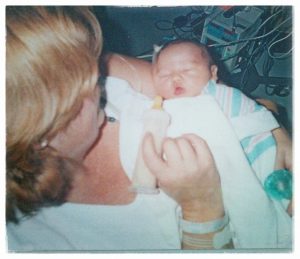Clean Hands May Have Saved My Son’s Life
Posted on by
As both a mom and preschool teacher, I have said “wash your hands” more times than I can imagine. Before my newborn son died in a hospital, I never imagined I needed to say it to a doctor. But if all healthcare personnel always used proper hand hygiene in my son’s care, sepsis may not have been a part of my baby’s hospital stay. The single most important thing healthcare personnel can do to protect their patients is clean their hands.
I returned to the preschool classroom without my son. Instead, I brought a new passion for ongoing hand hygiene practices. I also stayed in the healthcare setting as a patient advocate reminding personnel to step up their commitment to proper hand hygiene.
When I went from a preschool classroom to the inpatient setting with a newborn, I expected the doctors and nurses did what was needed based on their experience and knowledge. The complexity of the healthcare was overwhelming and impressive. Who was I to remind highly educated, respected professionals to simply clean their hands? Through my advocacy, I learned research demonstrated healthcare providers may not clean their hands as often or as required unless they knew they were being watched. Yet, the discovery of the impact of hand hygiene to reduce infections went as far back as the 1800s.
Each day, multiple times a day in the preschool setting, teachers are washing their hands…and teaching children when and how to wash their own hands. Even these young children can properly wash their hands! It has been a part of a layered strategy to prevent the spread of germs in childcare even before the COVID-19 pandemic.

Healthcare personnel are incredibly busy. Any help that we can offer these stressed caregivers serves both patients and clinicians.
To help your providers help you, remember these steps in advocating for proper hand hygiene:
- In health care settings, ask the clinician to clean their hands before they touch you (even if they are wearing gloves).
- Always clean your hands when you enter your loved one’s hospital room, before touching the patient and before leaving the room by washing hands with soap and water or using alcohol-based hand sanitizer.
- It’s OK to ask for clean hands. It could save your or your loved one’s life. A simple mention from you may be a welcome reminder to your doctors and nurses to clean their hands.
- Teach proper hand hygiene at the youngest of ages so this simple, but critical tool for saving lives becomes second nature.
After the death of her son, James, to preventable medical errors Mary Ellen volunteered her time collaboratively with many local, state and national organizations to improve safe care for all. This includes her service as the governor-appointed consumer representative of the Pennsylvania Patient Safety Authority through 2020 and ongoing participation with the Patient Safety Action Network. She also authored the book, “Split the Baby: One Child’s Journey Through Medicine and Law”.
Mary Ellen is a Coach and Program Health Consultant for Pennsylvania’s Early Head Start – Child Care Partnership. She is a wife, mother of five and grandmother “Mimi” to one.
Posted on by

